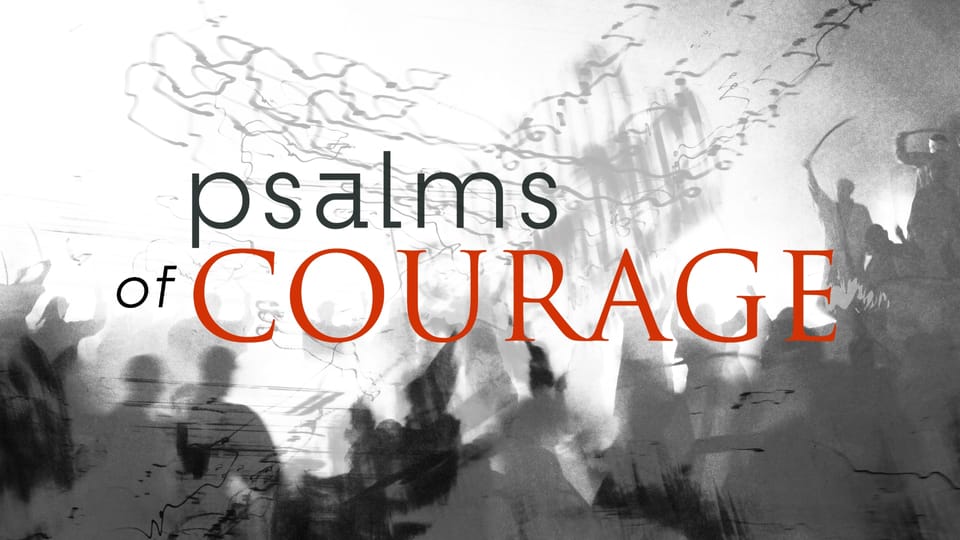Trusting God in Crisis (Psalm 31)

Big Idea: In crisis, turn to God, remind yourself what’s true, and then you’ll be able to help others take courage in God.
Someone I know and respect went through one of the hardest crises of his life.
He had reached the peak of his professional career. He’d had a solid track record of accomplishments. But out of nowhere, a powerful group of people turned against him and forced him out of his job.
“It just about took me out,” he said.
And so, for a year, their agenda was simple: “to try not to die, to pray, and to re-think at a profound level.”
To this day, it’s still a difficult time for them to talk about.
As a pastor, I’ve had the privilege of walking with people for over thirty years now. I’ve encountered many people like that.
What do you do when you face a crisis that almost takes you out, that leaves you trying not to die, that leaves you rethinking things at a profound level? That’s what I want to talk to you about.
A Versatile Cry for Help
Today I want to look at Psalm 31. It’s a psalm that cries out to God for help. It’s written by David. What’s the situation behind the psalm? We just don’t know. Some psalms give the historic situation, but this one doesn’t. David faced similar situations throughout his life, like when a city was going to give him to Saul in 1 Samuel 23, or when his own son turned against him later on.
What is the situation that David faced? As I said, we don’t know the incident, but David tells us the problems he faced. He faced a conspiracy of enemies against him, so much so that even his friends deserted him.
Because of all my adversaries I have become a reproach,
especially to my neighbors,
and an object of dread to my acquaintances;
those who see me in the street flee from me.
I have been forgotten like one who is dead;
I have become like a broken vessel.
For I hear the whispering of many—
terror on every side!—
as they scheme together against me,
as they plot to take my life.
(Psalm 31:11-13)
Whatever the problem, this psalm is pretty versatile. It’s been used by God’s people throughout the years as their own cry for help.
- A later psalmist — perhaps David himself — re-used the first three verses in Psalm 71.
- Jonah quotes from verse 6 when he’s trapped in the belly of the fish.
- The prophet Jeremiah quoted from verse 13.
- Jesus quoted verse 5 for his last words from the cross when he was abandoned by his disciples during his arrest.
- Many Christians throughout history have also used this psalm, including individuals such as Saint Bernard, John Huss, Jerome of Prague, Martin Luther, Philip Melanchthon, and many more.
One of the most memorable uses of this psalm was by John Huss, who was burned at the stake. The bishop ended the ceremony by saying: "And now we commit your soul to the devil." Huss replied calmly, “I commit my spirit into thy hands, Lord Jesus Christ; unto thee I commend my spirit, which thou has redeemed.”
This psalm can be used by God's people in different crisis situations, such as death and betrayal. This psalm has given people — including Jesus — words to use in the middle of crisis. It can do the same for you and for me.
Responding to Crisis
How do we respond to crisis? David shows us three ways to respond.
Turn to God as your only source of refuge.
Where do you turn in times of crisis? Some of us try to escape. We dull the pain through food, alcohol, drugs, and pleasure. Or we turn to friends to help us. But David shows us that there’s only one place we can ultimately turn in a time of trail. There is only one true refuge, and that’s God. Only he will provide the refuge that we need when we go through times of trial.
The theme of refuge keeps coming up in this psalm. David writes:
In you, O LORD, do I take refuge;
let me never be put to shame;
in your righteousness deliver me!
Incline your ear to me;
rescue me speedily!
Be a rock of refuge for me,
a strong fortress to save me!
For you are my rock and my fortress;
and for your name’s sake you lead me and guide me.
you take me out of the net they have hidden for me,
for you are my refuge.
(Psalm 31:1-4)
Over and over again in this psalm, the psalmist speaks of God as his refuge and says things like, “I trust in you” (Psalm 31:14).
We will face this choice every time we go through a crisis. Be honest: where do you turn in times of crisis? We all have coping strategies that we use in times of trial. Here is the one thing that they all have in common, apart from God: they will let you down. Your friends will let you down. Friends are great, but they can’t provide the refuge that only God can. Pleasure and escape tactics provide a temporary coping mechanism, but they don’t provide any true place of refuge at all.
We all need a secure place. When everything crumbles around us, we need one place that is safe, a place of security and protection. The psalmist points us to the only true place of refuge we will ever experience in times of trial: God himself.
When you go through trial, run to him. Find in him everything you need. He will not let you down.
So many passages reinforce this truth. The end of Romans 8 is a prolonged argument that God’s love for us is so secure that there is literally nothing in heaven and earth that can separate us from that love. God is a refuge that can withstand category 5 storms. His love for his people, shown through Jesus at the cross, is so great that you never have to fear that it will let you down.
If you have trusted Christ, you are secure in him. He is your refuge. Everything else will fail you, but you can trust in him. If you haven’t trusted Christ, turn to him today. You will find him to be the refuge you need.
Turn to God as your only source of refuge. That’s the first lesson. Here’s the second:
Expect that you will have to remind yourself.
Psalm 31 is a very interesting psalm.
The psalmist makes the journey from despair to trust twice: once in verses 1 to 8, and again in verses 9 to 24. One scholar (John Goldingay) notes:
If the psalm stopped after verse 8, it would be quite complete. It has pleaded with God to listen and act, declared faith in God, looked forward to what God could do, and looked forward to celebrating God’s standing our feet in a broad or dry place instead of the narrow or wet one where they now stand. Verses 9–20 could equally stand alone.
Why? We don’t know for sure, but I have a guess. When you’re in a crisis, you can work yourself to a place of trust. You can finally get to the point where you have found refuge in God. But then you wake up the next morning, or something happens again, and you are in despair again. You have to work yourself back into trust over and over again.
You even see this at the end of verse 2 and the start of verse 3:
Be a rock of refuge for me,
a strong fortress to save me!
For you are my rock and my fortress…
He’s essentially saying, “Be a rock of refuge… For you are my refuge.” Which is it? It depends on how he feels at the moment. Sometimes he feels the reality of God as his refuge; other times he has to pray that God would become his refuge.
As one commentator says:
Sometimes it takes the repeating of a prayer over and over for the people praying to believe what they are saying, especially when the situation doesn’t change immediately. And sometimes we have to repeat it over and over so that the voices of those who want to wash us away don’t drown out our hope. (Goldingay)
Somehow, in the middle of a crisis, we have to keep working our way back to what we believe. You can’t just trust God once in a crisis. You have to keep working your way back over and over again to trust.
Expect that you will have to remind yourself of what is true about God because you will forget it over and over again. Remind yourself of the truths of the gospel that we so quickly forget. Remember that God will never leave us or forsake us.
I love how the Reformer Martin Luther put it:
Here I must take counsel of the gospel. I must hearken to the gospel, which teaches me, not what I ought to do, (for that is the proper office of the law), but what Jesus Christ the Son of God hath done for me: to wit, that He suffered and died to deliver me from sin and death. The gospel wills me to receive this, and to believe it. And this is the truth of the gospel. It is also the principal article of all Christian doctrine, wherein the knowledge of all godliness consists. Most necessary it is, therefore, that we should know this article well, teach it unto others, and beat it into their heads continually.
We forget this daily, so we need to preach this to ourselves daily. We need to remind ourselves of the truths of the gospel. God is still gracious to sinners. He will receive anyone who comes to him with empty hands of faith. He will turn no-one away who comes to him in repentance and trust. And he will never let you go.
Turn to God as your only source of refuge, and expect that you will have to remind yourself to do this over and over again.
There’s one more lesson I want to point out from this psalm:
Use the crisis to point others to God.
Something interesting happens at the end of the psalm. In verses 1 to 22, he speaks directly to God in the middle of the crisis. He pours out his heart to God. He expresses his trust in Yahweh, talks about what he’s going through, and asks Yahweh to help him.
But in verses 23 to 24, he turns from speaking to God and addresses God’s people. Listen to what he says:
Love the LORD, all you his saints!
The LORD preserves the faithful
but abundantly repays the one who acts in pride.
Be strong, and let your heart take courage,
all you who wait for the LORD!
Here’s what happens in this psalm. David goes through a horrible crisis. He feels abandoned. His very life is at stake. He wobbles a little. Even when he trusts God, he has to preach to himself again because it’s easy to slip back into despair.
But as he continues to trust God in the crisis, something happens. He gets to point others to God. There’s nothing like seeing a godly person go through trial, even imperfectly. When you see someone suffer well and find that God is good, they can stand up and point others to God too. They can tell others, “Be strong, and let your heart take courage, all you who wait for the LORD!”
In 2 Corinthians 1, Paul says that God “comforts us in all our affliction, so that we may be able to comfort those who are in any affliction, with the comfort with which we ourselves are comforted by God” (2 Corinthians 1:4). God never wastes our pain. As you trust God in the middle of your trial, and find God to be a secure refuge, you can point others to God because of what you have discovered about God in the middle of your suffering.
I love how Spurgeon puts it: “All the saints are benefited by the sanctified miseries of one, if they are led by earnest exhortations to love their Lord the better.”
Hard times are going to come. What should we do? In crisis, turn to God, remind yourself what’s true, and then you’ll be able to help others take courage in God.
Earlier on, I mentioned someone who went through the crisis of his life. It left him simply trying to survive and stay alive, and that period lasted for some time. But out of that experience came his most fruitful years. He found God to be his refuge. It wasn’t easy, but God provided for him in that crisis, and as a result, he’s been able to point many others to God. He credits everything to:
…the grace and mercy of God. I’m not joking… I’m so struck by God’s kindness and faithfulness, his steady patience… God is so patient and so gentle, so rarely confrontational. He’s provident, thoughtful, wise. His care is amazing. I cannot explain these last ten years any other way.
Turn to God in crisis. Remind yourself of what’s true. And then God will use your sufferings to point others to take courage in God, so they can find that God is faithful too.





